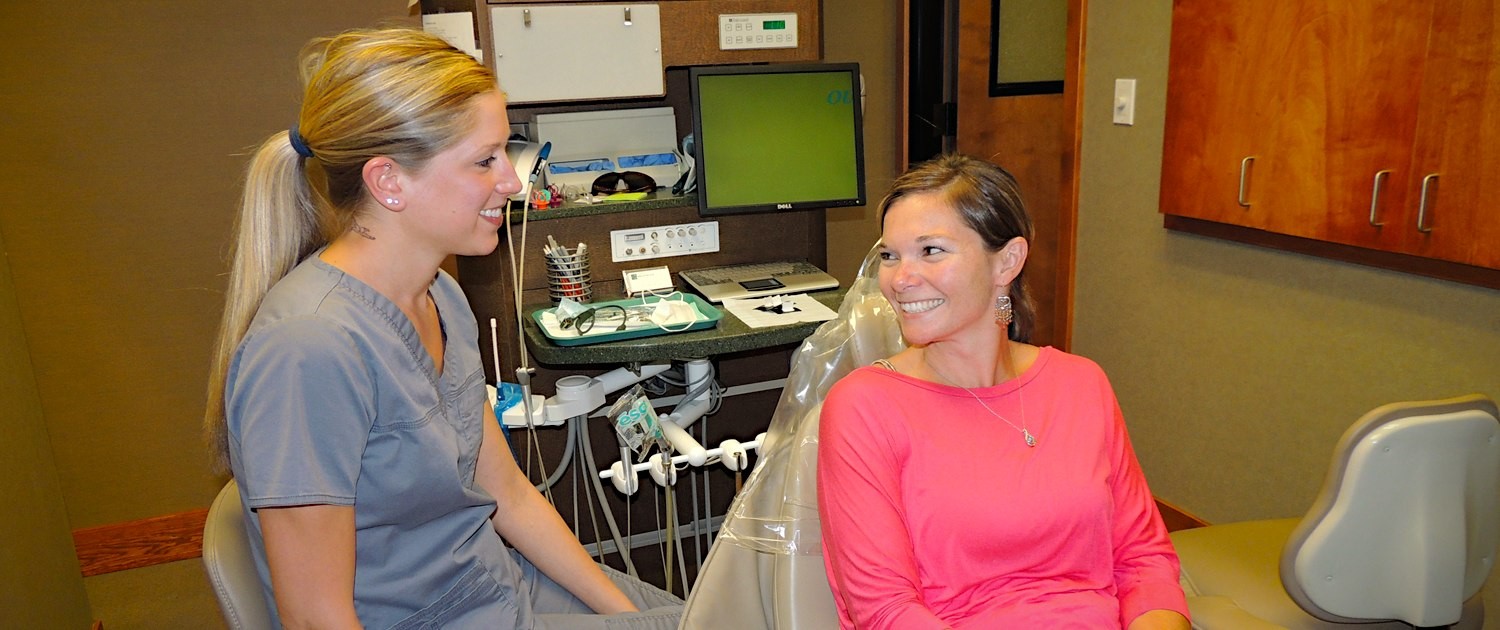Dental Exam
An exam is an evaluation preformed by Dr. Brewster to determine any changes in the patient’s dental status since the last exam. Dr. Brewster will review x-rays, check existing restorations, oral cancer and periodontal screening, along with a head and neck exam.
Preventive Maintenance (Cleaning)
A preventive maintenance appointment is preformed by your Hygienist every 6 months to prevent excessive plaque and calculus build up; along with the removal of any staining. If needed, there are cleanings that are more involved, such as:
- Debridement is the removal of plaque and calculus that interferes with Dr. Brewster’s ability to perform an oral exam.
- Scaling and Root Planning is a theriputic procedure designed to remove plaque and calculus below the gum tissue, to promote healing.
- Periodontal Maintenance is the removal of bacterial plaque and calculus from supragingival and subgingival areas, following scaling and root planning. This procedure continues at varying intervals (3-4 months), determined by your Hygienist and Dr. Brewster.
Xrays
Xrays are important, diagnostic, and preventive tools that provide essential information. These allow Dr. Brewster to make an accurate diagnosis that may otherwise go unseen in a regular exam.
Homecare
Homecare is one of the most important parts of your dental care. Homecare is the patients responsibility to keep the teeth and gums healthy in between your preventive maintenance appointments. Regular brushing twice a day, careful flossing, along with regular cleanings, will help maintain the health of your teeth and gums.
Crowns
A crown covers the entire tooth and surface restoring it to it’s original size and shape. The crown strengthens the tooth structure that cannot be restored with fillings or other restorations.
Reasons for Crowns:
- Broken or Fractured tooth
- Decayed tooth
- Large or compromised filling
- Root canaled tooth
- Excessive wear
A crown requires at least two office visits. The initial visit, the tooth is prepared, an impression taken and a temporary placed. The second visit, we remove the temporary and fit the crown. Any adjustments needed will be made and the crown will be permanently cemented.
Bridge
All of your teeth play an important role in appearance, speaking, chewing and in maintaining the alignment of other teeth. Correction of tooth loss is necessary to maintain proper function of your mouth. A bridge is one of a few different options for correcting tooth loss.
A bridge is a device which fills the gap where teeth are absent; by attaching to the adjacent teeth. These anchor teeth are called the abutments; the artificial tooth taking the place of the gap is called the pontic.
Attending regular dental appointments along with great home care, will keep the bridge and surrounding teeth clean. This is of great importance as the bridge relies on neighboring teeth for support.
Bonded Fillings
Bonded fillings are a tooth colored composite resin used to restore the function, integrity and aesthetics of a compromised tooth.
Reasons for Bonded Fillings:
- Broken or Fractured tooth
- Decayed tooth
- Wear
The tooth is prepared for the procedure and thoroughly cleaned before the new filling is placed. The composite resin is placed, shaped, adjusted and polished to a natural shape and appearance.
Good oral hygiene, eating habits, and regular dental visits will aid in the life of your new fillings.
Dental Implants
Dental implants are designed to provide a foundation for replacement teeth that look, feel and function like natural teeth.
Implants are small titanium posts that are placed into the jawbone where teeth are missing. The bone bonds with the titanium, creating a strong foundation for the artificial teeth. Implants can help preserve facial structure, preventing loss of bone which occurs when teeth are missing.
If you feel implant dentistry is the best choice for you, you will need to have a dental examination, including an xray and health history review. During your exam your specific needs and considerations will be addressed.Your questions and concerns are very important to us! We will work closely with you to ensure your procedure is a success.
Inlays and Onlays
Inlays and Onlays are made of porcelain (tooth colored material), that are bonded to the damaged area of the tooth. An inlay is used inside the cusps of the tooth, similar to a filling. An only is like and inlay but extends over one or more of the tooth’s cusps.
They require two office visits to complete the procedure. During the first visit, the filling being replaced or the damaged or decaying area is removed. The tooth is prepared for the inlay or onlay; an impression is taken and sent to the lab to be fabricated. A temporary will be placed until the next appointment. During the second appointment the temporary is removed and the inlay or onlay is bonded to the tooth, adjusted and polished.
Oral Surgery (Extractions)
An Extraction is preformed for many reasons. Some of the most common are sever decay, broken or fractured beyond repair, orthodontic reasons or sever bone loss. Fortunately there are procedures that Dr. Brewster is trained to perform to restore your smile; such as Root Replacement or Dental Implants, Crowns, Bridges and Partials or Full Dentures.
Root Canals (Endodontics)
A root canal is preformed to clean out the infected tooth pulp (nerve) and disinfect the canal(s). Once the infection is gone, the canal is filled to prevent from any further infection. A root canal may need to be done when an untreated cavity reaches the nerve. Treatment may also be needed when deep restorations or trauma to the tooth causes nerve damage. When the pulp or nerve becomes infected it can start effecting the surrounding bone causing and abscess. An abscess is not only painful but it will not heal on it’s own, requiring treatment.
Some of the symptoms that indicate and infection are sensitivity to hot and or cold, sweets, pain, swelling, sensitivity to pressure (biting) or a bad taste in the mouth. However, sometimes no symptoms are apparent. Once a root canal is preformed and completed, a restoration will need to be done to restore the integrity of the tooth. Such as a filling or a build up and crown.
Night Guards and Mouth Guards
Custom night guards and mouth guards are made of a flexible material and shaped to fit your teeth.
Night guards are recommended for patients that clench or grind their teeth.
Mouth guards are used to protect teeth and the jaw during physical activities and sports. These guards also protect the tongue, lips and cheeks.
Patient Resources
Our Office
4801 W. Fairview St. Boise, ID 83706
Phone: (208) 376-7447
Fax: (208) 375-2907
Monday, Wednesday, Thursday and Friday: 7:00 AM – 3:00 PM
Tuesday: 8:30 AM – 5:00 PM
Email: [email protected]

